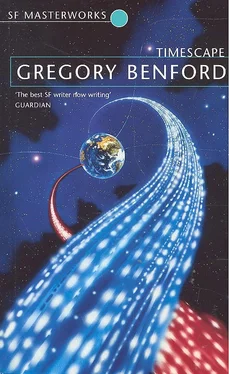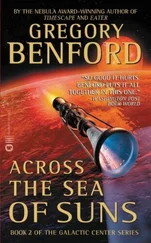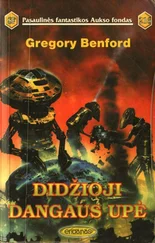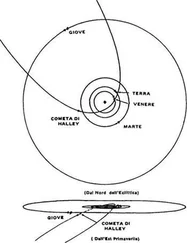Markham said, “I think that may be an explanation for the anomalous noise level. It’s not thermally generated at all, if I’m right. Instead, the noise comes from tachyons. The indium antimonide sample isn’t just transmitting tachyons, it’s receiving them. There’s a tachyon background we’ve neglected.”
“A background?” Renfrew asked. “From what?”
“Let’s see. Try the correlator.”
Renfrew made a few adjustments and stepped back from the oscilloscope. “That should do it.”
“Do what?” Peterson demanded.
“This is a lock-in coherence analyzer,” Markham explained. “It culls out the genuine noise in the indium sample—sound wave noise, that is—and brings up any signals out of the random background.”
Renfrew stared intently at the oscilloscope face. A complex wave form wavered across the scale. “It seems to be a series of pulses strung out at regular intervals,” he said. “But the signal decays in time.” He pointed at a fluid line which faded into the noise level as it neared the right side of the screen.
“Quite regular, yes,” Markham said. “Here’s one peak, then a pause, then two peaks together, then nothing again, then four nearly on top of each other, then nothing. Strange.”
“What do you trunk it is?” Peterson asked.
“Not ordinary background, that’s clear,” Renfrew answered.
Markham said, “It’s coherent, can’t be natural.”
Renfrew: “No. More like…”
“A code,” Markham finished. “Let’s take some of this down.” He began writing on a clip-board. “Is this a real-time display?”
“No, I just rigged it to take a sample of the noise for a hundred-microsecond interval.” Renfrew reached for the oscilloscope dials. “Would you like another interval?”
“Wait till I copy this.”
Peterson asked, “Why don’t you just photograph it?”
Renfrew looked at him significantly. “We have no film. There’s a shortage and priority doesn’t go to laboratories these days, you know.”
“Ian, take this down,” Markham interrupted.
• • •
Within an hour the results were obvious. The noise was in fact a sum of many signals, each overlaid on the rest. Occasionally a short stuttering group of pulses would appear, only to be swallowed in a storm of rapid jiggling.
“Why are there so many competing signals?” Peterson asked.
Markham shrugged. He wrinkled his nose in an unconscious effort to work his glasses back up. It gave him an unintentional expression of sudden, vast distaste. “I suppose it’s possible they’re from the far future. But the vest pocket universe sounds good to me, too.”
Renfrew said, “I wouldn’t put much weight on a new astrophysical theory. Those fellows speculate in ideas like stock brokers.”
Markham nodded. “Granted, they often take a grain of truth and blow it up into a kind of intellectual puffed rice. But this time they have a point. There are unexplained sources of infrared emission, far out among the galaxies. The microuniverses would look like that.” He made a tent of his fingers and smiled into it, his favorite academic gesture. At times like these it was comforting to have a touch of ritual to get you through. “That scope of yours shows a hundred times the ordinary noise you expected, John. I like the notion that we’re not unique, and there is a background of tachyon signals. Signals from different times, yes. And from those microscopic universes, too.”
“It comes and goes, though,” Renfrew observed. “I can still transmit a fraction of the time.”
“Good,” Peterson said. He had not spoken for some while. “Keep on with it, then.”
Renfrew said, “I hope the fellows back in 1963 haven’t got the detector sensitivity to study this noise. If they stick to our signals—which should stand out above this background, when we’re transmitting properly—they’ll be all right.”
“Greg,” Peterson mused, his eyes remote, “there’s another point.”
“Oh? What?”
“You keep talking about the small universes inside ours and how we’re overhearing their tachyon messages.”
“Right.”
“Isn’t that a bit self-centered? How do we know we, in turn, are not a vest pocket universe inside somebody else’s?”
• • •
Gregory Markham slipped away from the Cav in early afternoon. Peterson and Renfrew were still unable to resist sniping at each other. Peterson was obviously drawn to the experiment, despite his automatic habit of distancing himself. Renfrew appreciated Peterson’s support, but kept pushing for more. Markham found the ornate dance between the two men comic, all the more so because it was virtually unconscious. With their class-calibrated speech patterns, the two men had squared off at the first differing vowel. If Renfrew had stayed a laborer’s son he would have got along smoothly with Peterson, each knowing his time-ordained role. As a man swimming in exotic academic waters, however, Renfrew had no referents. Science had a way of bringing about such conflicts. You could come out of nowhere and make your mark, without having learned any new social mannerisms. Fred Hoyle’s stay at Cambridge had been a case in point. Hoyle had been an astronomer in the old mold of eccentric-seeker-after-truth, advancing controversial theories and sweeping aside the cool, rational mannerisms when they didn’t suit his mood. Renfrew might well prove as remarkable as Hoyle, a working-class salmon swimming upstream all the way, if this experiment went through. Most rising scientists from obscure backgrounds nowadays kept a neutral, bland exterior; it was safer. Renfrew didn’t. The big modern research teams depended for progress on well-organized, smooth-running, large-scale operations, whose stability demanded a minimum of upsetting—what was the jargon—“interpersonal relationships.” Renfrew was a loner with a sandpaper psyche. The odd point was that Renfrew was quite civil towards most people; only the deliberate flaunting of class symbols by such as Peterson set him off. Markham had watched class friction worsen in England for decades, catching glimpses on his occasional visits, lime seemed to strengthen the ties of class, much to the confusion of the condescending Marxists who tended the lumbering government programs. The explanation seemed clear to Markham: in the steepening economic slide, following on the rich years of North Sea oil, people stressed differences, in order to keep alive their sense of self-worth. Us against Them stirred the blood. Better to play that distracting, antique game than to face the gray grip of a closing future.
Markham shrugged, mulling this over, and walked along the Coton footpath back toward the solemn spires of town. He was an American and thus exempt from the subtle class rituals, a visitor given a temporary passport. A year here had accustomed him to the language differences; now phrases like “the committee are” and “the government have” didn’t cause a stumble as the eye slid through the sentence. He now recognized Peterson’s skeptical arch of the eyebrow and rising, dry, “Hmmmm?” as a well-honed social weapon. The graceful, adroit sound of Peterson’s “lehzure” and “shedule” were certainly far better than the mechanical quack-quack of American administrators, who would call any information an “input,” were always “addressing a problem,” submitted proposals as a “package” but didn’t always “buy it,” and who engaged in “dialogue” with audiences; if you objected to such deliberately clanky talk, they answered that this was “only semantics.”
Markham thrust his hands into his jacket pockets and tramped on. He had been irked by a balky calculation in mathematical physics for days now, and wanted a long, solitary walk to help sweep his irritation away. He passed a construction site, where over-ailed chimps carried stonework and did the odd heavy job. Remarkable, what the tinkering with the DNA had done in the last few years.
Читать дальше












